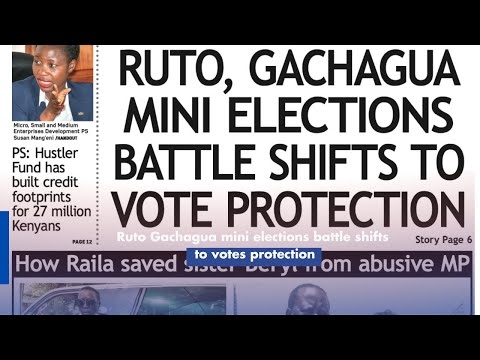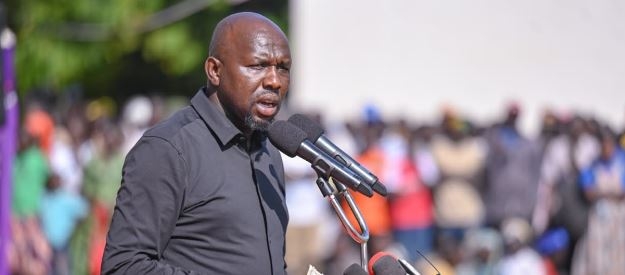Born on February 2,1985, Johnson Sakaja became an MP at age 28 in 2013.
This was after President Uhuru Kenyatta’s The National Alliance (TNA) party, for which he was chairman, nominated him to the National Assembly.
It was, however, not the first time he was getting involved in politics.
The 2017 election was the third he was involved in and the first to be elected.
He was part of the Vijana na Kibaki lobby group in 2007 and TNA in 2013.
As part of the team that formed TNA and later Jubilee, he was behind the slogans "I Believe"and "Tuko Pamoja". Earlier, he was a student leader at the University of Nairobi.
“I have always had a dream for this country and always believed in leadership at an early age. People get into it for many reasons, some think it is lucrative, others think it is prestigious but I have always felt it as a calling right school and at Sonu [Student Organization of Nairobi University],” Sakaja told the Star in an interview at his office on Tuesday.
He attended Aga Khan Nursery and Primary School until 1998 and later went to Lenana School.
At the national level, he said, he was drawn to political by asking how top government leaders think.
“Are they special? How do they deliberate issues?” he would wonder.
His entry into Vijana na Kibaki was interesting as he joined as a driver.
“I was Patrick Ngatia's driver, he is now in Nyeri, and many would have said don't take that job. But I said once you know what you want and you have one foot in the door, then you can be a driver but drive and talk like a leader, act as an MP.”
“So, very quickly I went up through the ranks in that system. Ultimately, I was in charge of the technical part of President Kibaki's campaign at a about 22 years old and we would have one on one interactions and it demystified leadership,” he narrated.
Ngatia was a director at the Vijana na Kibaki campaign team.
Senator Sakaja, who has declared interest in the Nairobi governorship, said he learnt the ropes from President Mwai Kibaki and the top men and women in his administration.
“I'd sit with him with Ambassador [Francis] Muthaura and ministers and questions would come and I realised these people think just like us. Sometimes they might be afraid, clueless, just like us but there is a way in which they deliberate and President Kibaki was a very systematic person”.
“He'd take notes, he'd listen and be the last to speak in the room. Ultimately, among yourselves, an answer would be found. That way, Kibaki would bring out the best in everyone. I think that's why he ran a very good government because he brought out the best out of his ministers,” Sakaja said, noting that this is how he would run Nairobi, if elected governor.
After the reelection of President Kibaki in the controversial 2007 elections, Sakaja went back to his practice in finance at Arthur Johnson Consultants. He studied Actuarial Science at the University of Nairobi.
Having made contacts in government, Sakaja would “every so often” be called upon to give his thoughts by the Director of Political Affairs at the Office of the President Nancy Gitau.
“She would call me and ask what do you think about this? Do me a two-pager. At the time, there was the Kriegler Commission [which looked into the 2007-08 controversial election] and one of the recommendations following the post-election was the review of the skewed constituencies,” he recalls.
This is how Sakaja got involved in the 2010 Constitution making process.
Sakaja says President Daniel Moi had occasioned the representation problem during his regime as he had ensured that he had more MPs in his support base so that he had a majority in Parliament.
“So, when the Constitution making process started, Gitau asked me what I thought about constituencies delimitation: ‘Can you come up with a formula?’ I researched on the issue of representation and looked at countries across the world. I looked at mixed member proportional representation, first-past-the-post and looked at our situation. We had 290 constituencies and there were those that deserved to have more constituencies, others were supposed to be scrapped”.
“So, in Naivasha at the talks, that was one area where they were supposed to disagree. They said PNU and ODM should bring a consultant. ODM brought Prof Francis Aduol. His presentation was about numbers. I also know numbers but with a political language. So we created the formula in Article 89 -Delimitation of electoral units,” Sakaja said.
He, however, notes that they got at 290 constituencies because it was untenable to scrap those below the threshold and merge with the neighboring ones, as the people would have failed the referendum.
Asked if the additional 70 constituencies in the BBI were necessary, Sakaja said he doesn’t think they should have been increased.
“We should have given those who deserve theirs in a review. Only that it was coming around a political context,” he noted.
Sakaja would in August 2020 disagree with President Uhuru Kenyatta and his handshake partner Raila Odinga, the ODM boss.
The issue was the revenue sharing formula.
He rallied a number of senators from the Jubilee Party and marginalised areas under the banner “One Kenya Movement”, for which he was accused by his Jubilee colleagues of being a traitor.
The Jubilee leadership threatened to crack the whip, including removing him and others from the party.
But he says people misunderstood him.
“You can give a formula a tag, but it does not do what that tag is saying. So, one-man, one-shilling formula was not that. If it was the case, Nairobi was to get the highest increase, but it was getting an increase of Sh100 million, a small share of the revenue. It was number 28 gainer.”
“The formula I proposed did two things. One let no county get less than they've been getting but for any increase, let's focus on the population and other performance indicators. Ultimately, we ended up with Nairobi getting Sh3 billion more and it was the highest gainer. I said we must send resources to the people but let's not create an acrimonious situation where you are telling people that you are less Kenyan than others,” he explained.
In his evaluation of his record as senator, Sakaja says he is proud the allocation has increased from between Sh13billion -Sh14 billion to about Sh15.8 billion moving to Sh19-Sh20 billion.
“The work of a senator is to bring resources and I have ensured we have the highest,” he said.
He is now seeking to be governor to implement the laws he has legislated and more ideas in the Nairobi, the city he grew up in.
He is likely to face Kenya Chambers president Richard Ngatia, Westlands MP Tim Wanyonyi of ODM, Bishop Margaret Wanjiru and businesswoman Agnes Kagure.












![[PHOTOS] Family, friends receive body of Raila’s sister, Beryl](/_next/image?url=https%3A%2F%2Fcdn.radioafrica.digital%2Fimage%2F2025%2F11%2Fdfe6a9bf-ede1-47a4-bdc0-4f564edb03dd.jpeg&w=3840&q=100)



